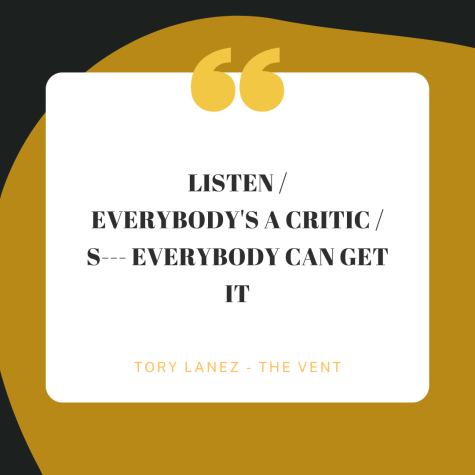‘Sorry 4 What’ is an unapologetic failure
Although filled with diverse music styles, Tory Lanez’s new album fails to stand out among previous works
The album cover, a blurry image of Lanez contrasted with bright and dark colors, previews a multitude of emotions showcased throughout the album.
October 13, 2022
“I’m not tryna be here for a long time / Just, just a good, good time / I got a lot of s— weighin’ on my mind”
“Sorry 4 What” encompasses aspects of Lanez’s personal and musical growth in a somber, hour-long journey that brings listeners to explore the ups and downs the mainstream rapper faced the past year. Released on Sept. 30, Lanez continues to find musical maturity after early success in the industry with a 20-track album: 18 solo songs and two tracks featuring rappers A Boogie Wit Da Hoodie and Yoko Gold. “Sorry 4 What” showcases Lanez’s vocal evolution —- the fast-paced rap that set his career shifts to a more mellow, R&B tone.
The album’s first track, “Sorry 4 What // LV Belt,” sets the tone for what’s to come: Lanez’s unapologetic frame of mind following his drama with rapper Megan Thee Stallion. The start of 2022 found the two in a chaotic situation after Lanez was accused of attempted murder with months spent in court. “Sorry 4 What // LV Belt” strives to present to the world Lanez’s clear thoughts on the situation — he believes he did nothing wrong, using lyrics like “So f——’ serious, you n—–‘ delirious / Said it wit’ exclamation, but n—–s can’t f— wit’ me, period.” After months of trial, the official court case was pushed back to the end of the year, and no information has been released.
Backed by melancholy synth chords, the introduction to the album dives directly into a grand entrance in which Lanez’s soft, melodic opening contrasts upbeat and intense rap. Mixing R&B and hard-core rap is a recurring motif throughout the album — in tracks such as “Hennessey Memories” Lanez delves further into the combination of styles that created his unique sound. The simplistic snare and kick combination for the tempo and grandeur synth voicings help to envelop the listener with Lanez’s rap narration.
The ability to shift seamlessly between vocal performances is one of the highlights of the album. Lanez undertakes different personas as the project progresses to better emphasize the underlying emotions behind each line. With this variety of voicings, Lanez gives the impression of multiple artists singing on the same track. Furthermore, in “Casa-Freak-H-s,” Lanez uses a slower tempo as well as an “offbeat” rhythm, showing off his ability to sing as well as rap.
However, it is the lyricism that reduces the overall flow of the album. Many of the songs revolve around Lanez’s experiences with women, often using derogatory language as well as objectification. Although this is a common theme in present day hip-hop, Lanez’s earlier discussion of more personal topics leaves listeners with a bad aftertaste from songs such as “Collection” and “Rare L.” The abundance of pleasant vocals and unique beats show lots of potential that seems to be wasted with the shallow lyricism present in the tracks.

Moreover, Lanez discusses heavily repetitive ideas, which makes sections of the album seem monotone. Finding the personal development that Lanez wants to present is difficult as listeners are forced to navigate the album to pick and choose its best songs. In addition, the diverse music styles present throughout the album make it harder to listen to in one sitting.
An emotional ride nonetheless, “Sorry 4 What” excels in demonstrating Lanez’s musical diversity and his response to the aforementioned drama. However, the plethora of shallow lyricism wastes the excellent backing tracks and takes away from the overall album quality. Although parts of the album do showcase Lanez’s impenitent side, it fails to give viewers a true understanding of what is going on in his life.
2/5



















